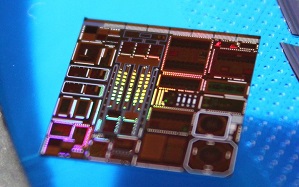


About CANDO
CANDO (Controlling Abnormal Network Dynamics using Optogenetics) is a world-class, multi-site, cross-disciplinary project to develop a cortical implant for optogenetic neural control. The goal is to create a first-in-human trial in patients with focal epilepsy. This seven year, £10M Innovative Engineering for Health Award, funded by the Wellcome Trust and the Engineering and Physical Sciences Research Council (EPSRC) involves a team of over 30 neuroscientists, engineers and clinicians based at Newcastle University, Imperial College London, University College London and The Newcastle Hospitals NHS Foundation Trust.
In the brain, nerve cells generate rhythmic activity or ‘brain waves’. In many neurological diseases these rhythms are disrupted, producing abnormal patterns of activity. In epilepsy, abnormal activity can often be localised to a small ‘focus’, which then spreads causing a seizure. Epilepsy affects 600,000 people in the UK and uncontrolled seizures have devastating effects on patients’ lives. Nearly a third of cases fail to respond to conventional drug treatments and may require surgical removal of the focus. However, surgery may not be suitable for all patients due to irreversible damage to necessary brain functions.
This project, led by Professor Andrew Jackson and Professor Anthony O’Neill, proposes an alternative treatment using a small implant to modulate abnormal activity and so prevent seizure development. The implant provides precisely timed stimulation by continuously monitoring brain waves via implanted electrodes and modifying them via implanted light sources. This requires that some cells within the focus are genetically altered using a safe virus to make them sensitive to light. The goal of this project is to create a successful first-in-human trial in epilepsy patients.
